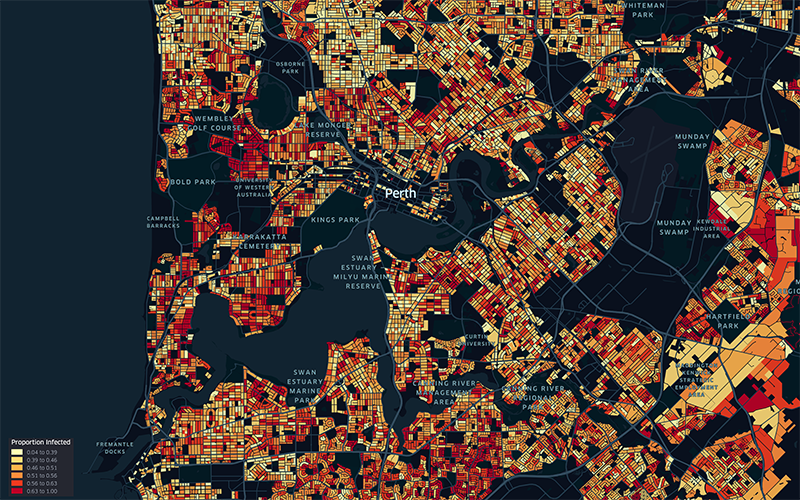Search
Research
Spatial codistribution of HIV, tuberculosis and malaria in EthiopiaHIV, tuberculosis (TB) and malaria are the three most important infectious diseases in Ethiopia, and sub-Saharan Africa. Understanding the spatial codistribution of these diseases is critical for designing geographically targeted and integrated disease control programmes. This study investigated the spatial overlap and drivers of HIV, TB and malaria prevalence in Ethiopia.
Research
Gaussian random fields: with and without covariancesWe begin with isotropic Gaussian random fields, and show how the Bochner-Godement theorem gives a natural way to describe their covariance structure. We continue with a study of Matérn processes on Euclidean space, spheres, manifolds and graphs, using Bessel potentials and stochastic partial differential equations (SPDEs).

News & Events
Sophisticated new modelling suggests keeping mask mandate could prevent 147,000 COVID-19 casesWA’s current Omicron COVID-19 outbreak could jump by 147,000 cases if mask mandates are abandoned before the Easter long weekend, according to sophisticated new modelling.

News & Events
New study identifies African ‘hotspot’ for highly infectious diseasesA regional corner of Africa is a hotspot for cases of HIV, tuberculosis and malaria, prompting researchers to call for targeted health support rather than a national response.

News & Events
WA’s Omicron wave on a downward trajectory, despite new variantsSophisticated modelling produced is predicting a steady decline in COVID-19 cases in WA throughout August, but hospitalisation rates will remain relatively high.

News & Events
Survivors of drug-resistant TB face long-term health problems: studyNew research highlights the long-term physical health problems faced by people who survive drug-resistant tuberculosis (TB) .
Research
Spatial clustering of drug-resistant tuberculosis in Hunan province, China: an ecological studyThis study aimed to investigate the spatial distribution of drug-resistant tuberculosis (DR-TB) in Hunan province, China. An ecological study was conducted using DR-TB data collected from the Tuberculosis Control Institute of Hunan Province between 2012 and 2018.
Research
Using Hawkes Processes to model imported and local malaria cases in near-elimination settingsDeveloping new methods for modelling infectious diseases outbreaks is important for monitoring transmission and developing policy. In this paper we propose using semi-mechanistic Hawkes Processes for modelling malaria transmission in near-elimination settings. Hawkes Processes are well founded mathematical methods that enable us to combine the benefits of both statistical and mechanistic models to recreate and forecast disease transmission beyond just malaria outbreak scenarios.
Research
Estimating the impact of imported malaria on local transmission in a near elimination setting: a case study from BhutanBhutan has achieved a substantial reduction in both malaria morbidity and mortality over the last two decades and is aiming for malaria elimination certification in 2025. However, a significant percentage of malaria cases in Bhutan are imported (acquired in another country). The aim of the study was to understand how importation drives local malaria transmission in Bhutan.
Research
Biases in Routine Influenza Surveillance Indicators Used to Monitor Infection Incidence and Recommendations for ImprovementMonitoring how the incidence of influenza infections changes over time is important for quantifying the transmission dynamics and clinical severity of influenza. Infection incidence is difficult to measure directly, and hence, other quantities which are more amenable to surveillance are used to monitor trends in infection levels, with the implicit assumption that they correlate with infection incidence.
